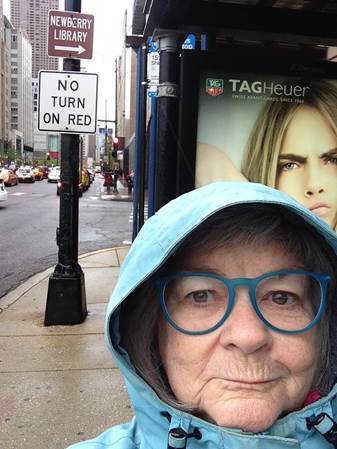How the ADA changed my life: I got a seat on the bus
by Beth
 In recognition of the 25th anniversary of the Americans with Disabilities Act (ADA) we’ll be publishing a series of guest posts here written by Easter Seals friends and staff members about ways the 1990 passage of the ADA has changed their lives. This first one is by Regan Burke, a civil rights activist and former White House staffer who rooted for ADA legislation in 1990 and is pleasantly surprised to be reaping the benefits personally now.
In recognition of the 25th anniversary of the Americans with Disabilities Act (ADA) we’ll be publishing a series of guest posts here written by Easter Seals friends and staff members about ways the 1990 passage of the ADA has changed their lives. This first one is by Regan Burke, a civil rights activist and former White House staffer who rooted for ADA legislation in 1990 and is pleasantly surprised to be reaping the benefits personally now.
by Regan Burke
“Wanna sit here?” The first few times a rider offered me a seat on the bus I was insulted. Was it really time to take a senior seat? My 50-year-old hair was carefully-chosen-no-grey auburn; my skin had wrinkled apace with age but a daily diet of donuts kept the permanent puckers plumped out and my face, I thought, looking younger. My body-balancing legs held up through the swaying and lurching of the bus. So no, a senior or disabled seat was not required. Not then.
Now I appreciate and indeed expect the offering of a seat on the bus. If I don’t get the raised-eyebrow question as soon as I climb aboard I enter into the great stare-down until I get a seat. I particularly relish trying to penetrate the insouciance of Gen-X and Millennial men.
Ever since the Chicago Transit Authority put signs on the bus a couple of years ago, “Federal Law Requires Priority Seating Be Designated for Seniors and People with Disabilities” riders offer their seats less and less frequently. Why? I certainly haven’t grown into a younger self in the past 25 years. My undyed hair is age-appropriate white and my facial features reflect their peasant-Irish heritage. Crumbling cartilage was removed in my mid-60s, and the result is a body that conspicuously careens on a moving bus. So why the snub?
Do riders resent that they are forced by federal law to accommodate me, a disabled senior? I think not. It’s not silent scorn, rather a sign of the times. No one reads signs anymore. Few notice seniors. And even fewer are awake-and-aware to the invisible infirmities of others.
On the bus people are peer-pressured into accommodating the visibly disabled who have canes, canines and chairs. My disguised disability displays itself only when I grimace or when my standing arthritic knees give way and I fall into someone’s lap.
The Americans with Disabilities Act is 25 years old. I learned from a photo exhibit at the Chicago History Museum, Access for All, that people in wheelchairs crawled out of their seats and laid themselves in front of and under buses demanding equal access on public transportation. There are photos of policemen dragging these brave bodies to jail.
I rooted for disability rights activists in the 1980s and ’90s. They represented a small segment of an overlooked and under-appreciated populace. It didn’t occur to me I would someday be a beneficiary of the hard-won campaign of this bold band of disabled dissidents.
I am profoundly grateful they gave me a seat on the bus.







July 14th, 2015 at 3:01 pm
Nice writing and an interesting perspective. Go Regan!
July 13th, 2015 at 5:42 pm
I fully agree with Regan Burke. I was not aware of the of the struggle the disabled had to go through, but things changed. I became disabled, and I am forever grateful that the federal law was passed. I find people, in general, are kind and helpful.